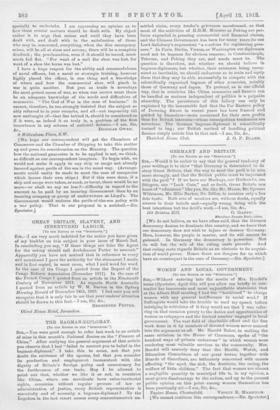WOMEN AND LOCAL GOVERNMENT.
rTo THE EDITOR OP THE "SPECTATOR:1 Stn,—Without entering into the merits of Mrs. Rendel's letter (Spectator, April 6th) will you allow me briefly to con- tradict her inaccurate and most unjustifiable statement that at the Albert Hall meeting I had the " hardihood " to charge women with any general indifference to social work P If Suffragists would take the trouble to read my speech before indulging in criticisms of it they would see that I was refer- ring on that occasion purely to the duties and opportunities of women as ratepayers and the limited number engaged in local government. The vast field of charitable effort and the fine work done in it by numbers of devoted women never entered into the argument at all. Mr. Harold Baker, in making the same criticism in the House of Commons, spoke of " the hundred ways of private endeavour" in which women were rendering most valuable services to the community. Mrs. Rendel will scarcely deny that the Health, Watch, and Education Committees of our great towns, together with Boards of Guardians, are intimately concerned with causes affecting "the aged, the sick, the destitute, the erring, the welfare of little children." The fact that women are almost a negligible quantity in municipal life is, in my opinion, a most grave disadvantage to the nation, and up to the present public opinion on this point among women themselves has been practically nil.—I am, Sir, &c., Tapton House, Chesterfield. VIOLET R. MARKHAM. LWe cannot continue this correspondence.—En. Spectator.]






































 Previous page
Previous page